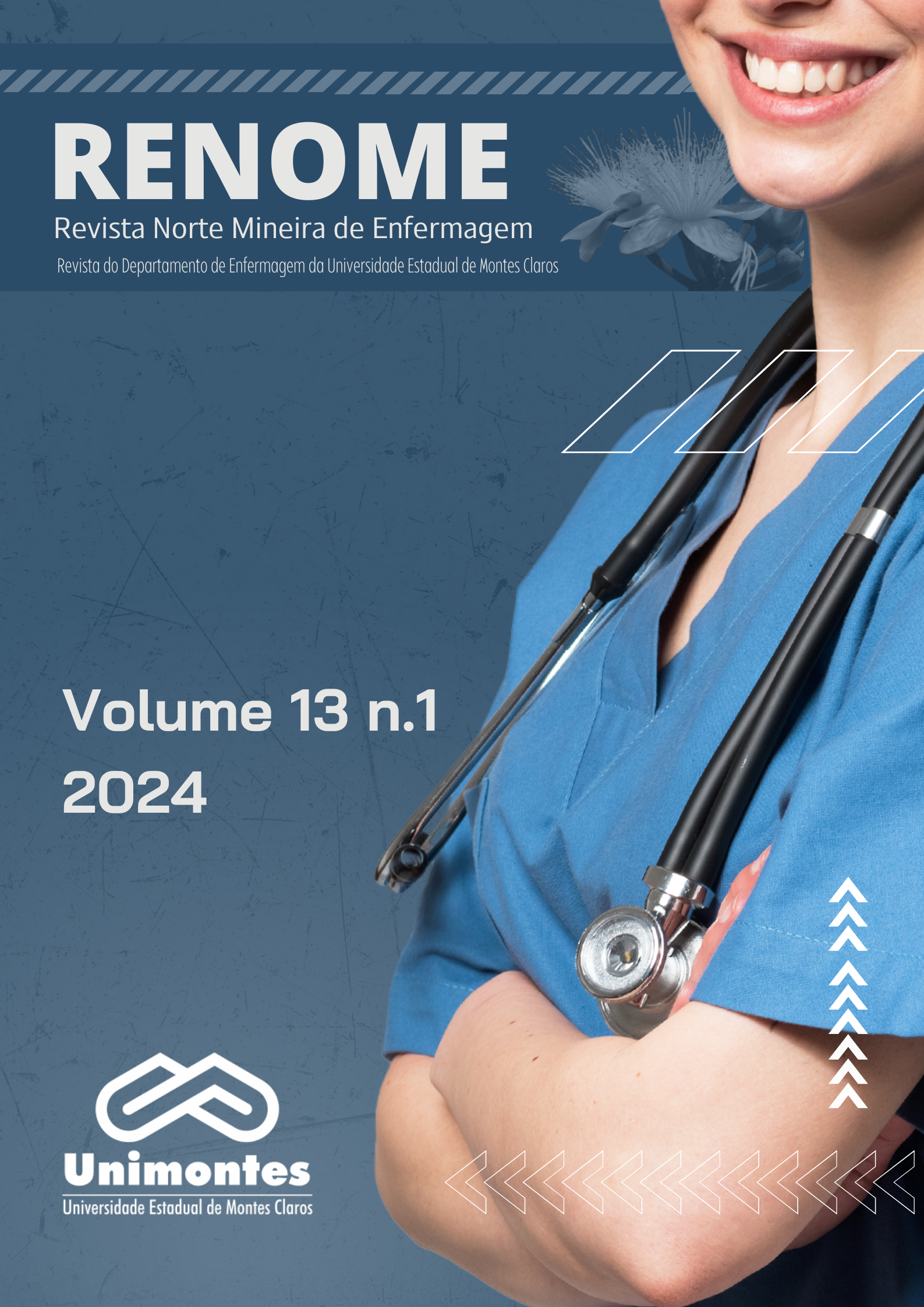PROTOCOLO DE REVISÃO DE ESCOPO SOBRE FATORES DE RISCO E DE GRAVIDADE DA DEPRESSÃO PÓS-PARTO PATERNA
DOI:
10.46551/rnm20240101Palavras-chave:
Depressão, Depressão Pós-Parto, Período Pós-Parto, PaternidadeResumo
Objetivo: Mapear às evidências científicas sobre os fatores de risco e gravidade associados à depressão pós-parto paterna. Método: Trata-se de um protocolo de revisão de escopo usando o guia metodológico do Joanna Briggs Institute (JBI) Reviewer’s Manual for Scoping Reviews e Preferred Reporting Items for Systematic reviews and Meta-Analyses extension for Scoping Reviews. Para seleção dos estudos, os critérios de inclusão serão: artigos quantitativos e qualitativos, em todos idiomas, sem data limite de publicação. As buscas serão realizadas nas bases de dados: Cumulative Index to Nursing and Allied Health Literature, Excerpta Médica Database, Literatura Latino-Americana e do Caribe em Ciências da Saúde, Medical Literature Analysis and Retrieval System, Scopus e Web of Science. Para a seleção dos dados será utilizado Rayyan®, para extração dos dados usará um instrumento disponibilizado por JBI, os dados serão agrupados sobre os temas relacionados. O protocolo está na plataforma Open Science Framework® sob registro: https://doi.org/10.17605/OSF.IO/SRYG2.
Descritores: Comportamento Paterno. Efeito Paterno. Depressão Pós-Parto. Período Pós-Parto. Paternidade
Downloads
Referências
Thiel F, Pittelkow MM, Wittchen HU, Garthus-Niegel S. The Relationship Between Paternal and Maternal Depression During the Perinatal Period: A Systematic Review and Meta-Analysis. Front Psychiatry. 2020 Oct 29;11:563287. https://doi.org/10.3389/fpsyt.2020.563287
Tokumitsu K, Sugawara N, Maruo K, Suzuki T, Yasui-Furukori N, Shimoda K. Prevalence of perinatal depression among Japanese men: a meta-analysis. Ann Gen Psychiatry. 2020 Nov 18;19(1):65. https://doi.org/10.1186/s12991-020-00316-0
Ramchandani PG, Stein A, O'Connor TG, Heron J, Murray L, Evans J. Depression in men in the postnatal period and later child psychopathology: a population cohort study. J Am Acad Child Adolesc Psychiatry. 2008 Apr;47(4):390-398. https://doi.org/10.1097/CHI.0b013e31816429c2
Gutierrez-Galve L, Stein A, Hanington L, Heron J, Ramchandani P. Paternal depression in the postnatal period and child development: mediators and moderators. Pediatrics. 2015 Feb;135(2):e339-47. https://doi.org/10.1542/peds.2014-2411
Atif M, Halaki M, Chow CM, Raynes-Greenow C. Risk factors of paternal postnatal depression in Pakistan: Findings from an urban sample. Nurs Health Sci. 2022 Sep;24(3):618-624. https://doi.org/10.1111/nhs.12954
Culpin I, Hammerton G, Stein A, Bornstein MH, Tiemeier H, Cadman T et al. Maternal postnatal depressive symptoms and offspring emotional and behavioral development at age 7 years in a U.K. birth cohort: The role of paternal involvement. Dev Psychol. 2023 Apr;59(4):770-785. https://doi.org/10.1037/dev0001482
Nishimura A, Fujita Y, Katsuta M, Ishihara A, Ohashi K. Paternal postnatal depression in Japan: an investigation of correlated factors including relationship with a partner. BMC Pregnancy Childbirth. 2015 May 31;15:128. https://doi.org/10.1186/s12884-015-0552-x
Koh YW, Chui CY, Tang CS, Lee AM. The Prevalence and Risk Factors of Paternal Depression from the Antenatal to the Postpartum Period and the Relationships between Antenatal and Postpartum Depression among Fathers in Hong Kong. Depress Res Treat. 2014;2014:127632. https://doi.org/10.1155/2014/127632
Nath S, Russell G, Ford T, Kuyken W, Psychogiou L. Postnatal paternal depressive symptoms associated with fathers' subsequent parenting: findings from the Millennium Cohort Study. Br J Psychiatry. 2015 Dec;207(6):558-9. https://doi.org/10.1192/bjp.bp.114.148379
Falceto OG, Fernandes CL, Kerber SR. Alerta sobre a depressão pós-parto paterna. Revista Brasileira de Ginecologia e Obstetrícia [online]. 2012, v. 34, n. 7, pp. 293-295. https://doi.org/10.1590/S0100-72032012000700001
Vismara L, Rollè L, Agostini F, Sechi C, Fenaroli V, Molgora S et al. Perinatal Parenting Stress, Anxiety, and Depression Outcomes in First-Time Mothers and Fathers: A 3- to 6-Months Postpartum Follow-Up Study. Front Psychol. 2016 Jun 24;7:938. https://doi.org/10.3389/fpsyg.2016.00938
Gawlik S, Muller M, Hoffmann L, Dienes A, Wallwiener M, Sohn C et al. Prevalence of paternal perinatal depressiveness and its link to partnership satisfaction and birth concerns. Arch Womens Ment Health. 2014 Feb;17(1):49-56. https://doi.org/10.1007/s00737-013-0377-4
Peters MDJ, Godfrey C, McInerney P, Baldini Soares C, Khalil H, Parker D. Scoping reviews. In: Aromataris E, Munn Z, editores. Joanna Briggs Institute reviewer’s manual. Adelaide: JBI; 2017
Tricco AC, Lillie E, Zarin W, O’Brien KK, Colquhoun H, Levac D, et al. PRISMA extension for scoping reviews (PRISMA-ScR): checklist and explanation. Ann Intern Med. 2018;169(7):467–73. http://dx.doi.org/10.7326/M18-0850
Peters MDJ, Godfrey C, McInerney P, Munn Z, Tricco AC, Khalil H. Scoping reviews (2020 version). In: Aromataris E, Munn Z, editores. JBI manual for evidence synthesis. Adelaide: JBI; 2020. (Chapter 11). http://dx.doi.org/10.46658/JBIMES-20-12
Ouzzani M, Hammady H, Fedorowicz Z, Elmagarmid A. Rayyan — a web and mobile app for systematic reviews. Systematic Reviews (2016) 5:210. http://dx.doi.org/10.1186/s13643-016-0384-4
Dang D, Dearholt SL, Bissett K, Ascenzi J, Whalen M. Dang Johns Hopkins evidence-based practice for nurses and healthcare professionals: models and guidelines. Baltimore. Sigma Theta Tau International; 2022
Centre for Evidence-Based Medicine. Levels of evidence [Internet] 2009. http://www.cebm.net/oxford- centre-evidence-based-medicine-levels-evidence- march-2009/
Publicado
Como Citar
Edição
Seção
Licença
Copyright (c) 2024 Gustavo Gonçalves dos Santos, Elen de Sousa Cardozo

Este trabalho está licenciado sob uma licença Creative Commons Attribution-NonCommercial-NoDerivatives 4.0 International License.

Nesta Revista, os Direitos Autorais para artigos publicados são do(s) autor(es), sendo os direitos da primeira publicação pertecentes à Revista Norte Mineira de Enfermagem. Os artigos são de acesso público, de uso gratuito, de atribuições próprias, de atribuições educacionais e de aplicações não comerciais.












